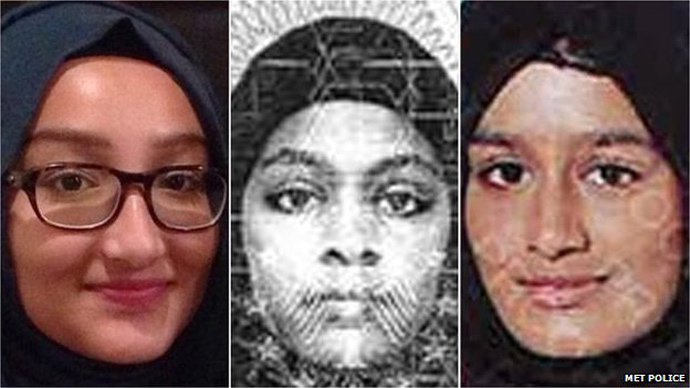Police fail to stop 3 UK schoolgirls joining ISIS despite social media clues

British police and security services have come under fire over the failure to stop three schoolgirls from traveling to Syria to become jihadist brides, despite one of the girls having tweeted a known Islamic State supporter.
It is feared Shamima Begum, 15, Kadiza Sultana, 16, and Amira Abase, 15, who flew to Istanbul last Tuesday, may have already crossed into Islamic State (IS, formerly ISIS/ISIL) controlled territory.
British police and intelligence agencies failed to notice a public message Shamima sent on Twitter to Aqsa Mahmood, a 20-year old from Glasgow who fled to join the IS militant group in 2013.
Families of the girls have a right to demand an inquiry into the oversight, claimed a lawyer for the Mahmood family.
Twitter also received criticism after it emerged Shamima was following dozens of IS extremists on social media.
CCTV footage of the three schoolgirls, who disappeared from their homes last Tuesday during the half-term holiday, shows them walking through Gatwick airport on their way to catch a flight to Istanbul.
It is believed the trio, who all attended the same school in East London, could be following a school friend who traveled to Syria last December.
Emerging evidence indicates they may have been radicalized online.
Two days before leaving the UK, Shamima contacted Aqsa Mahmood asking her to “follow me so i can dm you back [sic].”
Mahmood, who traveled to Syria to become a “jihadi bride” in November 2013, has over 1,500 followers on Twitter and has used the platform to encourage “sisters” to join her.
It is also alleged she has advocated terror attacks through Twitter.
Aamer Anwar, a lawyer for the Mahmood family, expressed “incredulity” that British police and security services failed to notice Shamima had contacted the known extremist.

“We are aware from contacts with Special Branch and the police that her social media is regularly checked and regularly monitored,” he said.
“The idea that a 15-year-old should make contact with Asqa, who is regarded as a terrorist, a member of [the Islamic State], yet no action is taken.
“The family of a young girl do not have the customary knock on the front door?
“Surely families have a right to demand an inquiry in to what has gone wrong here,” he added
Questions have also been raised as to how the three schoolgirls were able to fly to Istanbul without rousing suspicion with border officials.
Speaking on BBC Radio 5 Live, former foreign secretary William Hague said it was unrealistic for security services to notice everything.
READ MORE:3 British teen ‘jihadi brides’ already crossed into Syria – report
“It’s unrealistic to expect that every single thing is found and remember that we’ve spent the last couple of years being heavily criticized for having so much surveillance.”
“You are looking for needles in haystacks. What’s remarkable is how often we do find the needle in the haystack,” he added.
Hague went on to call for “updated” powers for security services to match changing technology.
Baroness Warsi, who was the first Muslim woman to become a cabinet minister, warned vulnerable young people were being “radicalized in their bedrooms.”
Speaking to Sky News, she said: “Online radicalization is of course a large aspect of it.”
“It's where young people hang out, it's where they get a lot of their information and therefore it's only natural it's where they would go for their material in terms of becoming radicalized.”
Warsi, who resigned from the Cabinet last August in protest at the government’s policy on the Israel-Gaza conflict, said blaming mosques and Islamic educational institutes was an “easy answer.”
“It’s becoming more and more apparent that people are not being radicalized in places of worship, but they're being radicalized in their bedrooms by being on the internet.”
“Much resource has gone into making sure websites are taken down but we are fighting an ever-losing battle with extremist groups.”
Warsi’s comments come as it emerges Shamima was following up to 70 Twitter accounts linked to IS extremists.
Despite closing dozens of accounts linked to IS, Twitter’s policies enable new accounts to be easily created under different names.
READ MORE:British jihadist woman escapes ISIS to Turkey
A spokesman for the social media giant said the company only takes action when alerted to inappropriate posts by other users. It does not monitor user content, he said.
Families of the schoolgirls made emotional pleas on Sunday, calling for them to return home.
Speaking of Shamima’s disappearance, her older sister Renu said: “It’s left a big hole in the house. Her family love her more than anybody else in this world can.”
Mark Keary, head teacher at Bethnal Green Academy where the three girls studied, claimed there is no evidence the girls had been radicalized at school.
Speaking at a press conference on Monday, Keary said social media access at the school is strictly regulated.
“With such measures in place, police have advised us that there is no evidence that radicalization of the missing students took place at the academy.”












